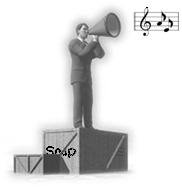Preached on Sunday, August 29, 2004 at St. Augustine's Church, Croton-on-Hudson, NY: http://www.stacroton.org/
Lectionary readings this sermon is based on are found at:
http://www.io.com/~kellywp/YearC/Pentecost/CProp17.html
+ In the name of the Eternal Majesty, the Incarnate Word and the Abiding Spirit, Amen.
Like all good Southern mothers, my mom tried to teach proper table manners to my brother and me. I remember a sort of parable that my mother used to tell us at the dinner table, when Thanksgiving or Easter or another ‘to-do’ was around the corner -- and my brother and I needed a refresher in table manners.
This story, which might well be true, was embellished and dramatized a bit by my mother to great effect by my mother. It was about an American spy operating deep undercover in Nazi-occupied Europe. According to my mom, this particular spy was an American who had successfully infiltrated the upper echelons of the Third Reich. With impeccable German, our spy was completely successful in his ruse. None of the Nazis realized that there was a spy in their midst. Until…. apparently there was some sort of Nazi dinner party and unfortunately for our spy, he had not learned European table manners. When cutting and eating his food, he lay down his knife and moved his fork to his right hand, like a properly brought up American. The Germans, of course, keep their forks in their left hands. According to my mother, the Germans instantly knew that there was something amiss. But they continued on with the meal, laughing and lapping up the Liebraumilch. And then after the meal, which was following by coffee and a lovely dessert, probably a Linzer torte or Black Forrest cake or something, they took the American spy out back and shot him.
My brother and I got the message loud and clear: the wages of inappropriate table manners is death.
Meals are so important in the Gospels; and they are deeply symbolic. The feeding of the multitudes with the loaves and fishes, the Last Supper, and the Supper at Emmaus. These meals are not just opportunities to assuage hunger or to interact with friends and family. The miracle of the loaves and fishes is a metaphor for the inclusiveness of God’s kingdom; the Last Supper signifies the constant presence of Jesus in our lives, in our very bodies. At the Supper at Emmaus, the travelers become aware of the risen Christ in their midst in the breaking of the bread. The revelation of salvation comes when bread is blessed, broken and shared.
In today’s Gospel, Jesus is clearly seeking to impart more than a lesson about seating charts and guest lists. His parable is about humility and generosity; and it is about the justice of God’s kingdom, and the bounty of God’s love for us.
When Jesus tells his disciples to take the least place at the banquet table so that they may then be elevated by their host, he’s telling us about the hierarchy of God’s kingdom. Jesus is telling us that it is not for us to assume that we are the most worthy of God’s children, sure to meet with God’s special favor; but rather we are to sit in the lowliest place; to approach God, our host, with humility and it is God who will raise us to our rightful place at the table.
Humility is not something that you hear touted much lately. Hip-hop lyrics are built on braggadocio. Sports figures promise multiple gold medals; and pop culture figures are proud to be called divas. I think some of this overcompensation is meant to be a corrective to the low self-esteem that can come from growing up in poor or disadvantaged circumstances; or from the disfunctionality that challenges some families.
But I think in our culture that we often mistake humility for humiliation. Humiliation is the state that comes about when someone makes us feel of lesser value because of our race, or gender, or sexual orientation, or because of our physical prowess, or economic clout. Humiliation can and does devastate self-esteem. Any kid whose ever been bullied knows how debilitating it can make be.
But humility is not humiliation. I have a friend who describes humility this way. He says, “Humility is acting in ways that are authentic to your experience.” Not in ways that reflect your wealth or social status, or the advantages that you enjoy by right of birth. Rather an appropriate humility is a kind of truthfulness, an authenticity, a fealty to what is, rather than an expression of what we desire or think is our due.
As reformed Christians, we believe that salvation is God’s gift; that we are justified by faith, not by works, no matter how glorious or pious our accomplishments. I think Jesus’s message in today’s gospel is that we are God’s guests in this life and the next. And that we are to give thanks for our blessings, for our place at the God’s table without regard as to how exalted our place at that table might be. And, I agree with what Father David said in last week’s sermon. I think that when Jesus tells us that the last shall be first, and that those who are exalted will be humbled, what he is really saying is that God’s love is a great leveling force; that we are all equal in the bounteous love of our Creator. Jesus’s conflation of exaltation and humility doesn’t point so much to the new order of hierarchy in God’s kingdom but to the absence of it.
Jesus’s admonitions to his host in today’s Gospel are to share his bounty with those who will never be able to return the favor. Give without expectation of recompense. In doing so we imitate God’s love. I hear another tenet of the Reformation in Jesus’s instructions to the host: Our faith and our love and all our good works, as strong and sincere as they may be, cannot repay God for the gift of our Creation, nor for our salvation through the death and resurrection of God’s son. We are to give of our selves, our bounty, our blessing and our lives, in ways that reflect all that God has given us. And we are to do so freely, without regard for what may come back to us; for our God has given to us in ways in which we can never earn or repay.
I’m no great practitioner of the humility or freewheeling charity I’m preaching to you about today. I hate it when I don’t get the recognition or credit I feel I’m due. And if someone crowds ‘my space’ on the train or at my table at Starbucks, I don’t humbly move to a lesser place at the table. And if I didn’t get a Christmas card from you last year, you’re off the list for next year! I can’t say I’m completely altruistic in my charities either big or small.
Our balm in our inconsiderate and sometimes unjust world is but to remember all that God has shown of his love for us. When we accept God’s invitation to the table in humility, we may well find ourselves drawn ever closer to God’s glory. When we give without regard for what we may receive in return, we are a real and true part of God’s leveling justice; in our freest giving, we become God’s love pouring out to all the world.
Amen.
© Mark Robin Collins
20 December 2006
Sermon for Year C, Proper 17
Subscribe to:
Post Comments (Atom)







No comments:
Post a Comment